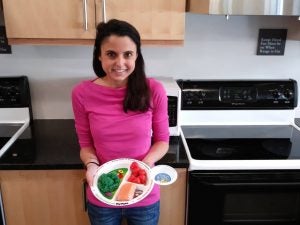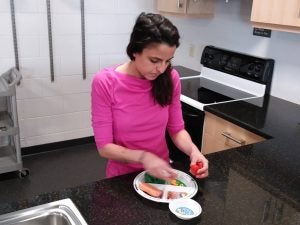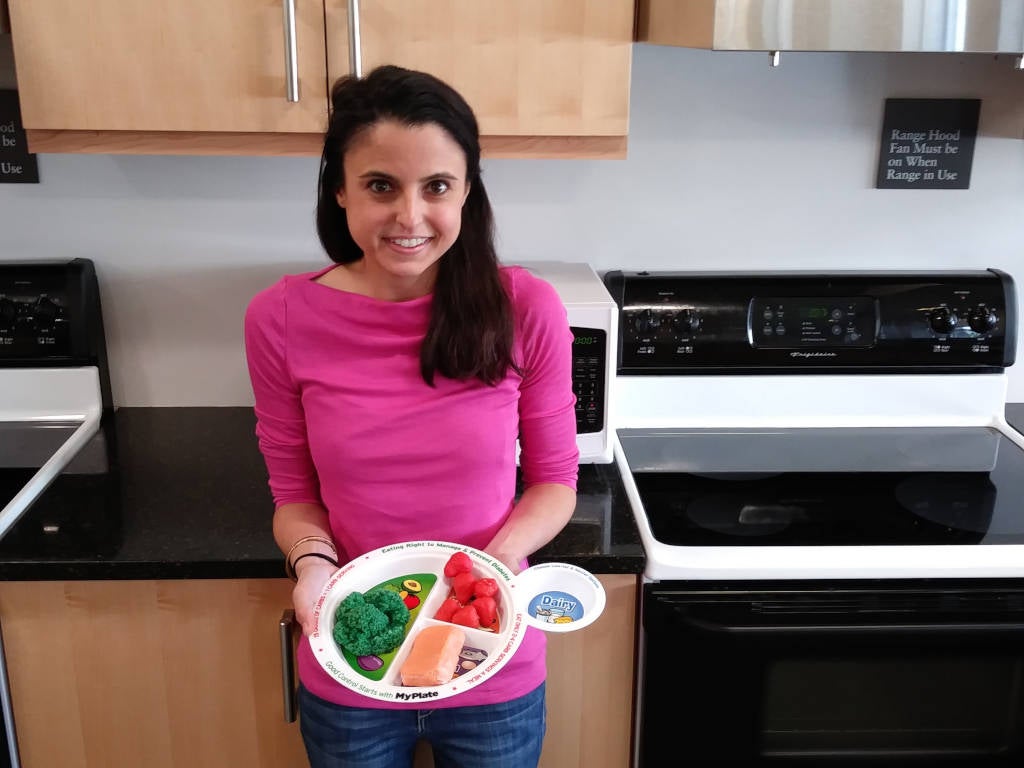Nutrition scientist aims to increase access, impact of nutrition therapy

While a high school track athlete in Franklin Lakes, NJ, Dara LoBuono was looking for any opportunity to improve her time and cross the finish line ahead of her competitors. A visit with a sports nutritionist gave her the edge she needed on the track, and propelled her toward a career helping others improve their lives through what they eat.
Now a master of nutrition and food science, and a Ph.D. candidate in biological environmental sciences, LoBuono is dedicated to helping others improve their conditions and their lives through eating right and gaining proper nutrition, particularly those with cognitive disabilities.
After earning her master’s degree at URI in 2014, LoBuono returned to her native New Jersey, where she worked for two years in a medically based fitness facility, counseling clients on incorporating nutrition into their lifestyles, hosting healthy cooking demonstrations and health fairs, and even working with New York Giants football players to promote health and nutrition in the community. But there was more she wanted to do, so she returned to URI in 2016 to begin working toward her Ph.D.
“I’ve always liked working with older adults. They have a lot of wisdom and I can learn a lot from them,” LuBuono said, explaining why she returned to school and began working with patients who have cognitive disabilities, including Parkinson’s disease. “Parkinson’s patients are very hungry for knowledge. They’re very motivated. I don’t have to feel like the food police.”
But she does patrol what her patients eat and monitors whether their diet is providing the nutrition they need. She takes an interdisciplinary approach, working with doctors, physical therapists, pharmacists and others to design a comprehensive approach to healthcare.
“We’re not just looking at one aspect of health; it’s an interdisciplinary approach,” LuBuono said. “There is more of a movement to include nutrition professionals in therapy, but a lot of patients don’t have access to it.”
She is increasing that access for Parkinson’s Disease patients by working with support groups for Parkinson’s and acquired brain injury patients organized by the departments of Nutrition and Food Science, Communicative Disorders, and Kinesiology, all part of the URI College of Health Sciences. She designs nutrition plans for patients that correspond to their specific disabilities, level of mobility and medications they may be taking, ensuring proteins in food don’t limit the effect of the drugs.
 LoBuono teaches patients what foods provide the nutrition they need and will be conducive to the physical limitations they experience, and she shows them how to combine those ingredients into an appetizing meal.
LoBuono teaches patients what foods provide the nutrition they need and will be conducive to the physical limitations they experience, and she shows them how to combine those ingredients into an appetizing meal.
“Swallowing is a big issue for many Parkinson’s patients,” LoBuono said, noting a nutritionist would notice, for example, if a patient is losing weight because he or she is trying to hide or deny a swallowing problem. “A speech therapist might suggest a texture of food that would work for them. We come in and teach them what to eat and how to eat what they want the right way. I try to cater meals to what they can eat, whether they can swallow, whether they can make it themselves. We also have to make sure they like it, too.”
In addition to her work with the support groups, LuBuono volunteers with URI’s Gateway Café for survivors of traumatic brain injury and the Rhode Island chapter of the American Parkinson’s Disease Association, and she is a graduate teaching assistant, leading classes in nutrition assessment, micro nutrients, nutrition and disease, and biochemistry.
At the same time, she is preparing to defend her doctoral thesis next month, which is aimed at further increasing accessibility of nutrition therapy for patients by incorporating digital health. She is exploring ways nutritionists can monitor patients’ diets digitally through digital conferencing, an app on their phones and perhaps with a wearable device that tracks the bites they take. She plans to continue in that vein in her post-doctoral work in rehabilitation science, incorporating nutrition and technology into rehab.
“A lot of patients don’t meet with a nutrition therapist; there are transportation or time constraints,” LuBuono said. “Digital health can monitor patients easily. I want to bring nutrition into the home.”

